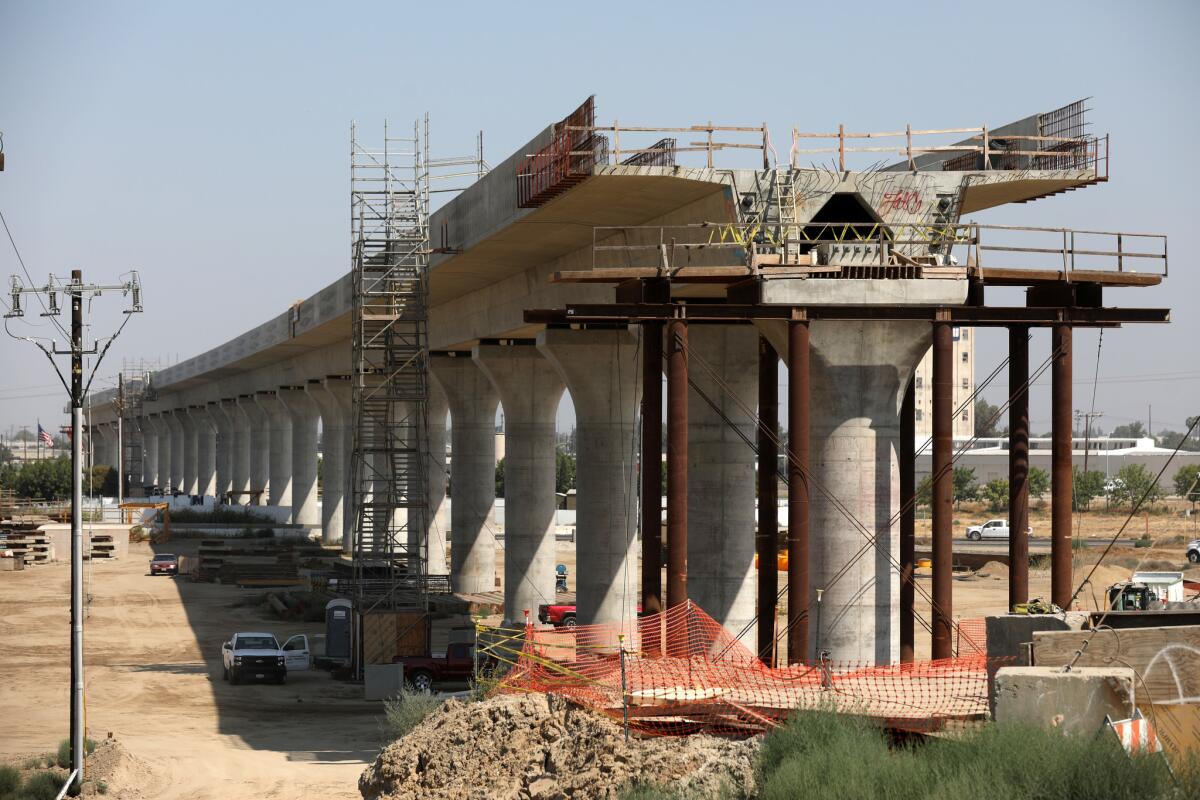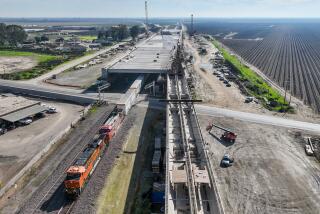California bullet train officials reveal ethics probe and OK plan for L.A. Union Station

- Share via
A California bullet train consultant facing allegations that its executives retaliated against employees for bringing forth negative information about the project has hired a law firm to independently investigate the matter.
The investigation was disclosed by the California High-Speed Rail Authority at a meeting of its Board of Directors on Tuesday where it separately approved a plan to help fund the modernization of Los Angeles Union Station.
The Times first reported the allegations about the firm, Montreal-based WSP, last month.
Brian Kelly, chief executive of the rail authority, said that WSP, which it calls its “rail delivery partner,” hired the law firm to investigate allegations by former WSP employees quoted in The Times.
The Times story reported that Mark Styles, WSP’s former senior supervisory scheduler for construction in the Central Valley, was ordered to withhold information that could be politically damaging to the project.
“I was told to shut up and not say anything,” Styles said. “I was told I didn’t understand the political arena the project was in. I told them I am not going to shut up. This is my job.”
Styles left his job at WSP in November.
The project is also being investigated by the criminal division of the U.S. Department of Transportation’s inspector general, The Times has learned. Former project officials told The Times that they were contacted by investigators out of the agency’s San Francisco office.
Styles said he was among those contacted. A former state engineer was contacted by the FBI, as well. The FBI and a spokesperson for the inspector general declined to comment in recent months.
Styles’ account of the project’s dysfunctional corporate culture was corroborated by a dozen current and former officials who work on the project. Two other former WSP executives, Todd Bilstein and Vera Lovejoy, told The Times that they too were discouraged from sharing bad news.
WSP officials rejected the allegations, saying that the firm prepares realistic and transparent reports on the projects it works on.
Former employees of the California high-speed rail project’s top consultant say they were punished for flagging problems and bringing bad news to their bosses.
The investigation disclosure was made at Tuesday’s board meeting in response to a question raised by board member Martha Escutia, a former state senator and now USC vice president for government relations.
Escutia said she raised the matter because it was important to protect the integrity of the project.
Kelly did not identify the law firm conducting the investigation, but Denise Turner Roth, a spokeswoman for WSP, said it had hired the San Francisco office of Fox Rothschild, a major U.S. law firm. She said WSP launched the investigation and informed the rail authority. A call to the firm’s office was not returned.
Separately, the rail authority board voted Tuesday to approve a long-delayed plan to provide its $423-million share of modernizing L.A.’s Union Station. The $950-million project would replace “stub-in” tracks, which force trains to back up out of the station, with run-through tracks.
The plan would cut many minutes off current schedules with seven elevated platforms with the run-through tracks that would pass over a bridge across the 101 Freeway and then turn toward the Los Angeles River. The improvements would also increase passenger capacity at the station.
The investment is part of the rail project’s so-called bookend investments into Los Angeles and San Francisco. The Bay Area is getting an even bigger investment with a plan to electrify the 50-mile Caltrain commuter system between San Jose and San Francisco.
In the public comment period of the meeting, several speakers came forward to endorse a proposal by Assembly Speaker Anthony Rendon (D-Lakewood), in which $5 billion of funding allocated to the Central Valley construction would be spent instead to improve the Southern California Metrolink system and the Bay Area’s commuter system.
Rendon said the investments would prepare the region for high-speed rail and in the meantime provide greater public value. A spokesman for a Little Tokyo business group asked the board to give serious consideration to Rendon’s proposal.
More to Read
Sign up for Essential California
The most important California stories and recommendations in your inbox every morning.
You may occasionally receive promotional content from the Los Angeles Times.














